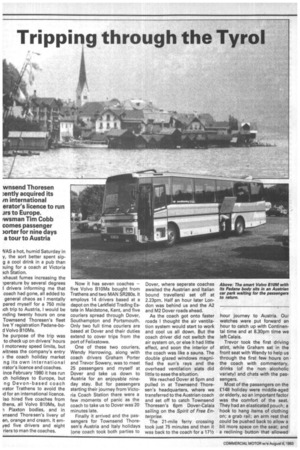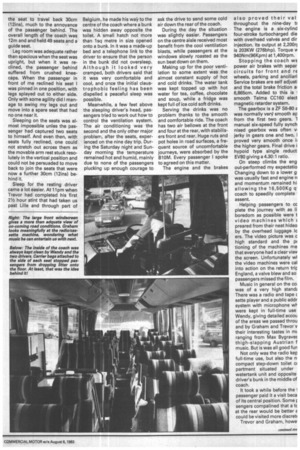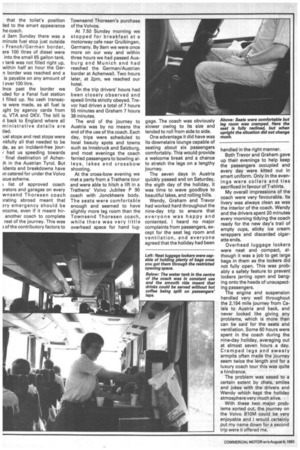Tripping through the Tyrol
Page 24

Page 25

Page 26

If you've noticed an error in this article please click here to report it so we can fix it.
VAS a hot, humid Saturday in y, the sort better spent sipg a cool drink in a pub than )uing for a coach at Victoria 3ch Station.
xhaust fumes increasing the Iperature by several degrees drivers informing me that coach had gone, all added to general chaos as I mentally pared myself for a 750 mile ich trip to Austria, I would be Inding twenty hours on one Townsend Thoresen's fleet lye Y registration Padane-bod Volvo BlOMs.
he purpose of the trip was to check up on drivers' hours I motorway speed limits, but Nitness the company's entry ) the coach holiday market ng its own international irator's licence and coaches. ince February 1980 it has run ch holidays to Europe, but ng Devon-based coach :rear Trathens to avoid the !d for an international licence. lso hired five coaches from thens, all Volvo B10Ms, but Plaxton bodies, and in vnsend Thoresen's livery of en, orange and cream. It emyed five drivers and eight riers to man the coaches. Now it has seven coaches — five Volvo B10Ms bought from Trathens and two MAN SR280s. It employs 14 drivers based at a depot on the Larkfield Trading Estate in Maidstone, Kent, and five couriers spread through Dover, Southampton and Portsmouth. Only two full time couriers are based at Dover and their duties extend to cover trips from the port of Felixstowe.
One of these two couriers, Wendy Harrowing, along with coach drivers Graham Porter and Trevor Sowery, was to meet 25 passengers and myself at Dover and take us down to Austria for an enjoyable nineday stay. But for passengers starting their journey from Victoria Coach Station there were a few moments of panic as the coach to take us to Dover was 20 minutes late.
Finally it arrived and the passengers for Townsend Thoresen's Austria and Italy holidays (one coach took both parties to Dover, where seperate coaches awaited the Austrian and Italian bound travellers) set off at 2.23pm. Half an hour later London was behind us and the A2 and M2 Dover roads ahead.
As the coach got onto faster roads I thought the air ventilation system would start to work and cool us all down. But the coach driver did not switch the air system on, or else it had little effect, and soon the interior of the coach was like a sauna. The double glazed windows magnified the sun's rays and the overhead ventilation slats did little to ease the situation.
We reached Dover at 5pm and pulled in at Townsend Thoresen's headquarters, where we transferred to the Austrian coach and set off to catch Townsend Thoresen's 6pm Dover-Calais sailing on the Spirit of Free Enterprise.
The 21-mile ferry crossing took just 75 minutes and then it was back to the coach for a 171/2
hour journey to Austria. Our watches were put forward an hour to catch up with Continental time and at 8.30pm time we left Calais.
Trevor took the first driving stint, while Graham sat in the front seat with Wendy to help us through the first few hours on the coach with commentary, drinks (of the non alcoholic variety) and chats with the passengers.
Most of the passengers on the £148 holiday were middle-aged or elderly, so an important factor was the comfort of the seat. They had an elasticated pouch; a hook to hang items of clothing on; a grab rail; an arm rest that could be pushed back to allow a bit more space on the seat; and a reclining button that allowed the seat to travel back 30cm (12ins), much to the annoyance of the passenger behind. The overall length of the coach was 12m and and held 49 seats and a guide seat.
Leg room was adequate rather than spacious when the seat was upright, but when it was reclined, the passenger behind suffered from crushed kneecaps. When the passenger in front of me reclined his seat I was pinned in one position, with legs splayed out to either side. Only with some agility did I manage to swing my legs out and move into a spare seat that had no one near it.
Sleeping on the seats was almost impossible unles the passenger had captured two seats to himself. And even then, with seats fully reclined, one could not stretch out across them as the movable arm rest stuck resolutely in the vertical position and could not be persuaded to move back to join the seats that were now a further 30cm (12ins) behind it.
Sleep for the resting driver came a lot easier. At 11pm when Trevor had completed his first 21/2 hour stint that had taken us past Lille and through part of
Belgium, he made his wait to the centre of the coach where a bunk was hidden away opposite the toilet. A small hatch not more than 1sq metre in size opened onto a bunk. In it was a made-up bed and a telephone link to the driver to ensure that the person in the bunk did not oversleep. Although it looked very cramped, both drivers said that it was very comfortable and cool, and once the initial claustrophobic feeling has been dispelled a peaceful sleep was possible.
Meanwhile, a few feet above the sleeping driver's head, passengers tried to work out how to control the ventilation system. The air conditioning was the second and the only other major problem, after the seats, experienced on the nine day trip. During the Saturday night and Sunday morning the temperature remained hot and humid, mainly due to none of the passengers plucking up enough courage to ask the drive to send some cold air down the rear of the coach, During the day the situation was slightly easier. Passengers on the centre aisle received most benefit from the cool ventilation blasts, while passengers at the windows slowly roasted as the sun beat down on them.
Making up for the poor ventilation to some extent was the almost constant supply of hot and cold drinks. The water tank was kept topped up with hot water for tea, coffee, chocolate and soup, while a fridge was kept full of ice cold soft drinks.
Serving the drinks was no problem thanks to the smooth and comfortable ride. The coach has two air bellows at the front and four at the rear, with stabilisers front and rear. Huge ruts and pot holes in road surfaces, a frequent source of uncomfortable journeys, were absorbed by the B1 OM. Every passenger I spoke to agreed on this matter.
The engine and the brakes also proved their val throughout the nine-day tr The engine is a six-cylind four-stroke turbocharged die with overhaed valves and dir injection. Its output at 2,200r1 is 203KW (276bhp). Torque v 940Nm(96Kpm) at 1,400rpm.
Stopping the coach WE power air brakes with separ circuits for front and re wheels, parking and anciliari Service brakes are self adjusti and the total brake friction a, 6,865cm. Added to this is 1 smooth Telma CC160 elect magnetic retarder system.
The gearbox is a ZF S6-80 was normally yen smooth ap from the first two gears. 1 manual six-speed fully synch nised gearbox was often v, jerky in gears one and two, I proved very smooth once ii the higher gears. Final drive i hypoid type single reduct EV80 giving a 4.30:1 ratio.
On steep climbs the eng out-performed my expectatio Changing down to a lower g, was usually fast and engine n and momentum remained hi, allowing the 16,500Kg coach to speedily complete . assent.
Helping passengers to cc plete the journey with as Ii boredom as possible were t video machines which E preared from their neat hideo by the overhead luggage lc ers. The video picture was c high standard and the pc tioning of the machines me that everyone had a clear viev the screen. Unfortunately wt the video machines were cal into action on the. return trip England, a valve blew and so passengers missed the film.
Music in general on the co. was of a very high standk. There was a radio and tape c sette player and a public addr system with microphone wlwere kept in full-time use Wendy, giving detailed accou of the areas we passed throu and by Graham and Trevor v their interesting tastes in rrn ranging from Max Bygravea thigh-slapping Austrian f music. But is was all good fun
Not only was the radio kep full-time use, but also the n compact step-down toilet cc partment situated under watertank unit and opposite driver's bunk in the middle of coach.
It took a while before the 1 passenger paid it a visit beca
of its central position. Some r
sengers cornpalined that a tc at the rear would be better a
could be visited more discretc Trevor and Graham, howe.
that the toilet's position Jed to the smart appearance he coach.
a 3am Sunday there was a minute fuel stop just outside French/German border, ere 100 litres of diesel were into the small 65 gallon tank. tank was not filled right up, within half an hour the Gern border was reached and a is payable on any amount of I over 100 litre.
/nee past the border we Ided for a Fanal fuel station I filled up. No cash transac'is were made, as all fuel is Aght by agency cards from Or VTA and DKV. The bill is it back to England where all ministrative details are tied,
uel stops and rest stops were nkfully all that needed to be de, as an incident-free jourhad us speeding towards • final destination of Achen:11 in the Austrian Tyrol. But idents and breakdowns have !n catered for under the Volvo ;cue scheme.
1 list of approved coach ?rators and garages on every wnsend Thoresert coach )rating abroad meant that ry emergency should be mcome, even if it meant hiranother coach to complete rest of the journey. This was of the contributory factors to
Townsend Thoresen's purchase of the Volvos.
At 7.50 Sunday morning we stopped for breakfast at a motorway cafe near Gruibingen, Germany. By 9am we were once more on our way and within three hours we had passed Ausburg and Munich and had reached the German/Austrian border at Achenwall. Two hours later, at 2pm, we reached our hotel.
On the trip drivers' hours had been closely observed and speed limits strictly obeyed. Trevor had driven a total of 7 hours 55 minutes and Graham 7 hours 38 minutes.
The end of the journey to Austria was by no means the end of the use of the coach. Each day, trips were scheduled to local beauty spots and towns such as Innsbruck and Salzburg, and most evenings the coach ferried passengers to bowling alleys, lakes and crossbow shooting.
At the cross-bow evening we met a party from a Trathens tour and were able to hitch a lift in a Trathens' Volvo Jubilee P 90 coach with Jonckheere body. The seats were comfortable enough and seemed to have slightly more leg room than the Townsend Thoresen coach, while there was very little overhead space for hand lug gage. The coach was obviously slower owing to its size and tended to roll from side to side.
One advantage it did have was its downstairs lounge capable of seating about six passengers comfortably. This would provide a welcome break and a chance to stretch the legs on a lengthy journey.
The seven days in Austria quickly passed and on Saturday, the eigth day of the holiday, it was time to wave goodbye to beautiful lakes, and rolling hills. .
Wendy, Graham and Trevor had worked hard throughout the nine-day trip to ensure that everyone was happy and contented. I heard no major complaints from passengers, except for the seat leg room and ventilation, and everyone agreed that the holiday had been handled in the right manner.
Both Trevor and Graham gave up their evenings to help keep the passengers occupied and every day were kitted out in smart uniform. Only in the evenings were collars and ties sacrificed in favour of T-shirts.
My overall impressions of the coach were very favourable. Its livery was always clean as was the interior of the coach. Wendy and the drivers spent 20 minutes every morning tidying the coach ready for the new day's trail of empty cups, sticky ice cream wrappers and discarded cigarette ends.
Overhead luggage lockers were neat and compact, although it was a job to get large bags in them as the lockers did not fully open. This was probably a safety feature to prevent lockers jarring open and banging onto the heads of unsuspecting passengers.
The engine and suspension handled very well throughout the 2,154 mile journey from Calais to Austria and back, and never looked like giving any problems, which is more than can be said for the seats and ventilation. Some 60 hours were spent in the coach during the nine-day holiday, averaging out at almost seven hours a day. Cramped legs and sweaty armpits often made the journey seem twice the length and for a luxury coach tour this was quite a hindrance.
The problem was eased to a certain extent by chats, smiles and jokes with the drivers and Wendy which kept the holiday atmosphere very much alive.
With these two major problems sorted out, the journey on the Volvo B10M could be very enjoyable and I would certainly put my name down for a second trip were it offered me.
































































































